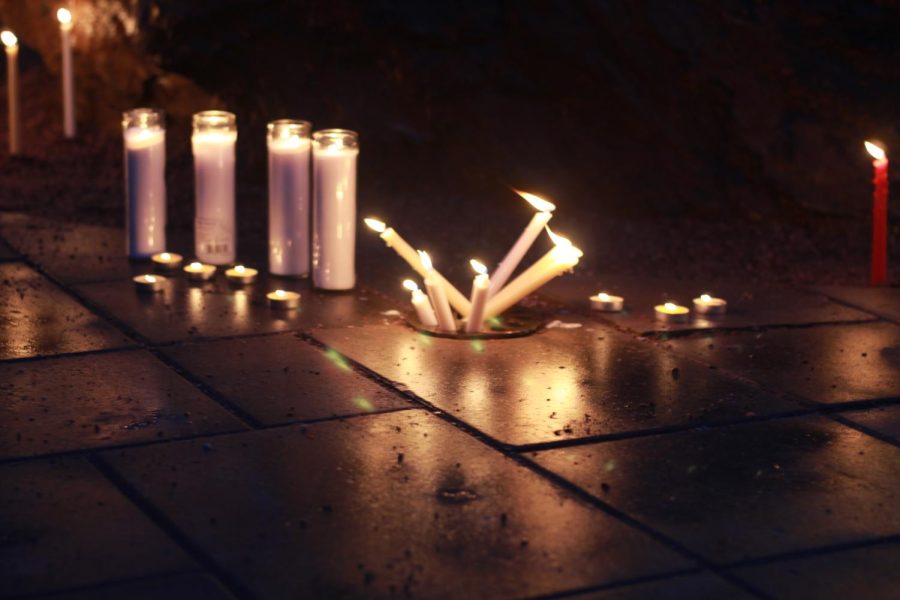Editorial—Our community is grieving
Following a recent death on campus, NMU must do more
April 14, 2022
When tragedies happen, they impact entire communities. Shock waves ripple out from those directly involved to those who are more distant.
On Sunday, April 3, NMU student Jayden Hill passed away in the Meyland dorm after she “tragically and unexpectedly lost her battle with mental health” according to her family’s memorial GoFundMe page written by her sister-in-law Aalyah Hill.
The death on campus came as a shock to the NMU community, and many of us heard about it some time before the NMU administration officially acknowledged the event. Approximately 150 students and community members attended a silent candlelight vigil honoring Hill on Monday, April 4. NMU announced the death on April 5 and lowered the campus flag to half-staff on Wednesday, April 6. As President Kerri Schuiling explained in an April 13 campus-wide email, the administration required consent from Hall’s family before announcing the death and lowering the flag.
According to her sister-in-law, “Jayden was such an active person in the community from shadowing district judges to being a collegiate track and field athlete. Everything she did was in an effort to better the life of someone else. Jayden was always fighting for equality for everyone and made it a point to stand up for those people who couldn’t stand up for themselves.”
Our community has been reacting to the loss of our peer in varying ways, ranging from denial to honoring her life. And as a community, finding ways to cope is crucial for our ability to support one another and heal.
“The deep-seated effects of a death by suicide reverberate throughout communities for years. That is why responsibly addressing the tragedy is so critical – healing relies heavily upon talking about what happened, learning, advocating, and moving forward together,” according to a postvention guide by Active Minds, a nonprofit organization focused on student mental health.
The Wildcat Women’s Track and Field team has declared an intention to honor Hill by dedicating their season to her. Meanwhile, many NMU professors have checked in with their classes regarding general mental health. The President’s office initially sent out an email on April 5, before acknowledging the death, cautioning students against posting online about recent “tough situations” on campus, while in the same email discussing benign happenings such as booster shots, weather and staff training.
In this email, the President advised, “NMU’s counselors recommend sticking as much to your normal routine as possible and keeping busy. They’ve told me they advise students to focus on their projects and classroom assignments to the best of their ability right now, recognizing that it’s normal for responses to vary. They advise doing things that will ground, center and relax you. But definitely seek out support, if needed.”
Yet needless to say, many of us have been having some difficulty remaining on track with our coursework while coping with the death of a peer on campus.
Deaths relating to mental illness in the student community are particularly difficult to cope with, partly because in these cases we’re not able to blame someone for the tragedy. Added to that, there is an additional stigma around mental illness, not to mention this particular event took place in a building where many of us live.
That said, many students have been dissatisfied with certain aspects of the university’s response to Hill’s passing. In particular, NMU’s mental health resources and responses have been under increased scrutiny in response to Hill’s death. One student organized and sent out an unofficial survey on student mental health on April 6. However, according to an NMU email sent out on April 8, this survey was shut down as it was not reviewed for standards in human subject research.
NMU’s mental health resources have often been criticized in recent years, with the lack of accessible, quality resources being one source of tension in the Fall 2021 semester’s contentious university forum. Many NMU students have had the experience of seeking help at the campus counseling center and being added to the waitlist. Until last Sunday, the waitlist was quite short, according to Dean of Students Chris Greer. Those who eventually receive counseling are only able to do so for a limited period of time because the services are short-term. NMU has added certain mental health resources in response to past criticism, including after-hours crisis counseling through Health Advocate, virtual mental health assistance modules, and one-minute wellness emails.
Schuiling responded to these criticisms in her April 13 email, explaining some of NMU’s history of providing mental health resources while asserting an intention to improve them in semesters to come. Particularly heartening, Schuiling shared that she is negotiating to arrange an assessment of our campus mental health resources.
This is some good news for our community in a difficult time. Mental health is a very serious concern for many of us, and for many of our friends. As of September 2021, Mayo Clinic reported that up to 44% of college students struggle with symptoms of depression and anxiety, and suicide is the third leading cause of death among college students. Mental wellbeing in our community is something to invest in. There is so much more we can do, and as we begin to prepare for our next academic year, we need to keep considering how we can implement changes to protect student wellbeing in the future.
If you or a friend are struggling with mental health please reach out to the National Suicide Prevention Lifeline: 1-800-273-8255


























